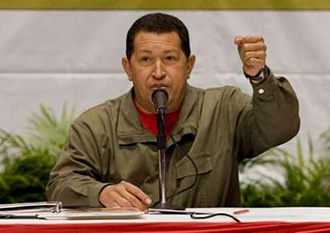
|
 |
 |
 News from Around the Americas | March 2008 News from Around the Americas | March 2008  
Venezuela Mobilizes Forces to Colombia Border
 Brian Ellsworth - Reuters Brian Ellsworth - Reuters
go to original


| | Venezuela's President Hugo Chavez speaks to supporters during an event in Caracas March 5, 2008. Venezuela deployed tanks and air and sea forces toward the Colombian border in its first major military mobilization of the crisis with its neighbor, Venezuela's Defense Minister Gustavo Rangel said on Wednesday. (Reuters/Carlos Garcia Rawlins) | | |
Caracas - Venezuela deployed tanks and air and sea forces toward the Colombian border in its first major military mobilization of the crisis with its neighbor, the OPEC nation's defense minister said on Wednesday.

The action escalates tensions over a Colombian weekend raid inside another South American neighbor, Ecuador, to kill rebels in an operation that Venezuelan President Hugo Chavez says could spark a war in the Andean region.

While leftist allies Ecuador and Venezuela have poured soldiers toward their borders with U.S.-backed Colombia in recent days, there had been noticeable movement of heavy firepower.

"I vote for peace and sovereignty," Defense Minister Gustavo Rangel said at a news conference. "We are here working for peace and prepared to defend our sovereignty."

With governments worldwide urging the nations to defuse tensions, Colombia has said it will not deploy extra forces to its borders in response.

The crisis pits leftists allies Venezuela and Ecuador against Colombia, which receives billions of dollars in U.S. military aid to fight drug traffickers and guerrillas.

U.S. President George W. Bush has condemned Chavez' "provocative maneuvers," vowed to oppose any aggression in the region and said Washington will stand by Colombia in the crisis.

Chavez says Bush is using conservative Colombian President Alvaro Uribe as a proxy in a plot to invade Venezuela, a major oil exporter to the United States. Washington denies the charge, similar to many the Cuba ally has made before.

"The concept of our mobilization is not against the people of Colombia ... but against the expansionist ambitions of the (U.S.) empire," Chavez's defense minister said.

Tank Battalions

Three days after the Venezuelan president ordered the deployments, Venezuela's military said it had started sending 10 tank battalions toward the border and activated its air force and navy. Military analysts estimate such a mobilization could include more than 200 tanks.

The military said the forces would be in place by the end of the day without specifying how many would actually be at the frontier.

Reuters witnesses in several border areas saw no sign of extra forces. Nor did Venezuelan media, which have reported small-scale troop movements in recent days, show any images of a larger mobilization.

Colombia's borders with Venezuela and Ecuador stretch in an arc from the Caribbean Sea to the Pacific Ocean on the eastern shoulder of South America, passing from desert through Andean mountains and Amazon jungles.

The borders remain open but Ecuador and Venezuela have cut diplomatic ties.

Ecuador sounded a conciliatory note on Wednesday, offering Colombia a diplomatic way out if it apologizes and pledges not to make other anti-rebel raids across the frontier.

"I hope in the short term relations can be restored," Ecuadorean Vice President Lenin Moreno told Colombian radio Caracol.

Led by diplomatic heavyweight Brazil, most Latin American governments have condemned Colombia for entering Ecuador to kill Marxist FARC guerrillas and urged it to apologize.

Despite the three leaders' brinkmanship and the risk of military missteps, political analysts said a military conflict was unlikely, especially as governments focused on diplomacy.

An emergency session at the Organization of America States, went into a second day on Wednesday as the Western Hemisphere's top diplomatic body deadlocked over the wording of a resolution on the crisis.

Some Venezuelans lobbied Chavez to avoid war by painting "peace" in large white letters on their car windows.

"It seems that the dispute has been contained at the political level, with the population in both Ecuador and Venezuela largely uninterested in the escalating conflict," Goldman Sachs economist Alberto Ramos said.

(Additional reporting by Pat Markey in Bogota; Writing by Saul Hudson, editing by Patricia Zengerle) | 
 | |
 |



